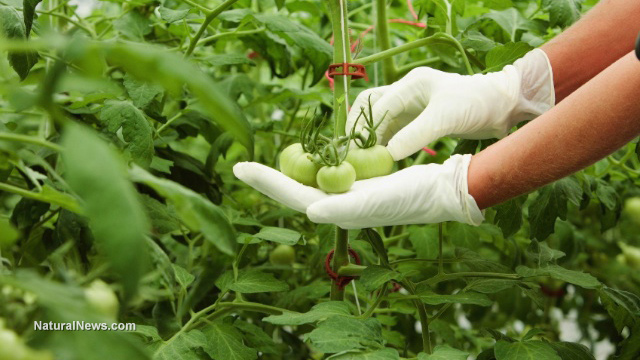Field-proven tips for successfully raising a summer vegetable garden
Wednesday, June 25, 2014 by: PF Louis
Tags: vegetable gardens, gardening tips, companion plants

- DEADLY FLU JAB WARNING: New flu vaccines make recipients 27 PERCENT MORE LIKELY to catch the flu
- Curcumin’s ancient healing power supercharges muscle recovery, and its effects are compounded with anti-inflammatory foods and supplements
- Trump’s EPA reviews fluoride safety amid growing concerns over risks to children’s health
- China’s counter-tariff strategies: A new chapter in the U.S.-China trade war
- WHO conducts a 2-day pandemic simulation called ‘Exercise Polaris’ - bringing together 350 predatory health groups worldwide
- CIA Official Terry Adirim TERMINATED for her role in pushing unlawful vaccine mandates on the military
- Barium detected in chemtrail fallout: Scientists suspect nuclear waste aerosolized over skies
- Aerosolized bioweapons? Strange “diploid biomasses” falling out of the sky in Florida captured under the microscope
- Fauci is back in the limelight, and he’s busy promoting a future COVID or FLU pandemic
- Tulsi Gabbard leads charge against the Biden regime’s global censorship of the 'Disinformation Dozen'
- How Israeli military-connected corporations are secretly controlling your online privacy
- Mysterious underwater pyramid off Japan could rewrite ancient history
- The hidden dangers of acetaminophen: Study links long-term use to ORGAN DAMAGE in seniors, but safer remedies are available
- Chemtrails unveiled: How the CIA and Big Business are manipulating the weather for profit
- Kiss Your Genetic Privacy Good-Bye! 23andMe Gets Green Light to Sell Your Intimate Genetic Details to Anyone They Want
- U.S. lawmakers investigate Meta over alleged China collaboration
- New study confirms brown rice contains 40% more toxic arsenic than white rice, putting young children at risk
- The art of minimalist prepping: Essential strategies for a simpler emergency plan
- Aerosolized bioweapons? Strange “diploid biomasses” falling out of the sky in Florida captured under the microscope
- Widespread social and economic unrest: Steve Quayle issues urgent financial warning of imminent asset collapse in new interview with Mike Adams
- Analysis: The coming economic collapse, a mass uprising and Trump's three secret weapons to halt the growing revolt
- Kiss Your Genetic Privacy Good-Bye! 23andMe Gets Green Light to Sell Your Intimate Genetic Details to Anyone They Want
- CLOT SHOT PLANDEMIC UNFOLDING: Fibrous, rubbery clots caused by covid injections have prion-like seeding activity
- Defunding DEADLY mRNA jabs: Government funding for mRNA technology being scrutinized and sidelined until proven "safe and effective" for real
- Mike Adams releases country western hit single: Goin’ Back in Time is Comin’ Home
- How Israeli military-connected corporations are secretly controlling your online privacy
- DEATH by VACCINE or face PRISON time: Canadian Freedom Convoy leaders CONVICTED for protesting forced vaccination during the Covid Plandemic
- European Court of Justice: Healthcare professionals who promoted or administered COVID-19 vaccines are CRIMINALLY LIABLE for any harm caused
- Tulsi Gabbard leads charge against the Biden regime’s global censorship of the 'Disinformation Dozen'
- Fauci is back in the limelight, and he’s busy promoting a future COVID or FLU pandemic
- Tulsi Gabbard takes aim at censorship: Justice for the ‘Disinformation Dozen’
- The hidden war above: Chemtrails, HAARP and the battle for planetary control
- “Project Aldrin”: Senate probes Meta's alleged censorship dealings with China
- Federal employees whine over DOGE's new directive requiring them to do a 5-point summary of weekly accomplishments
- U.S. approves new Russian ambassador as diplomatic thaw continues
- I Want My Bailout Money – new song and music video released by Mike Adams
- Newly released JFK files reveal Pentagon's role in creating Lyme disease and covid in the same lab
- Mike Adams releases country western hit single: Goin’ Back in Time is Comin’ Home
- Analysis: The coming economic collapse, a mass uprising and Trump's three secret weapons to halt the growing revolt
- Dr. Mike Yeadon releases 15-minute testimony - WATCH - about genocidal intent of COVID “vaccines”
- MEDICAL BOMBSHELL: FDA admits Covid mRNA 'Vaccines' CAUSE CANCER
- The Health Ranger releases “Vaccine Zombie” song and music video, using AI-animated zombies for the music video
- California's social media censorship law struck down: A victory for free speech or a threat to online safety?
- EPA advisor admits the agency is funneling billions to climate groups ahead of Trump’s return to White House
- Trump reverses course on Gaza plan, says “nobody is expelling Palestinians”
- Survival 101: Effective EMF blocking techniques
- Rep. Nancy Mace introduces bill to ban biological males from female facilities on federal property
- OpenAI whistleblower who dissented against how the company trained ChatGPT found dead
- 5 Simple steps to boost your brainpower: How to strengthen executive function in a distracted world
- CONSERVATIVES SOUND THE ALARM: Big Pharma and the Left trying to force $32 billion money grab from America’s seniors into year-end spending deal
- Florida takes a stand: DeSantis proposes permanent ban on mRNA vaccine mandates
- Sugarcane extract superior to cholesterol-lowering drugs?
- Pilots report mysterious lights 'moving at extreme speeds' across Oregon skies
- Trump Administration cuts 2,000 USAID jobs, places most employees on leave in sweeping reform effort
- Red Cross issues warning to stop blood plasma donations from vaccinated people
- Scientists confirm: GENIUS brain function can be spontaneously unleashed in humans without any apparent cause
- EPA advisor admits the agency is funneling billions to climate groups ahead of Trump’s return to White House
- HYSSOP: What research reveals about the health benefits of this ancient holy herb
- Two containers with completed ballots fall out of truck in Florida
- Fully vaccinated about to see “tsunami” of illness and death, warns virologist
- Global leaders unite to clamp down on “misinformation” with UN-backed Cascais Declaration
- Newly released JFK files reveal Pentagon's role in creating Lyme disease and covid in the same lab
- BREAKING: 2025 NDAA authorizes mandatory military draft of WOMEN across America… as Pentagon pursues global NUCLEAR war with both Russia and China at the same time
- Michael Yon warns of a ZIONIST TAKEOVER in Trump’s second administration
- Ozempic and Wegovy weight loss drugs are injectable LIZARD VENOM PEPTIDES that may unleash a devastating wave of organ failure… side effects align with symptoms of SNAKE BITES
- The Health Ranger releases “Vaccine Zombie” song and music video, using AI-animated zombies for the music video
- BOMBSHELL: DNA testing kits are a SCAM to develop ethnic-specific bioweapons
- Israeli soldiers accused of even more torture and abuse in the West Bank
- These 13 countries just signed an agreement to engineer a global FAMINE by destroying food supply
- NASA admits that climate change occurs because of changes in Earth’s solar orbit, and NOT because of SUVs and fossil fuels
- RFK Jr. clears key hurdle: Sen. Susan Collins backs controversial HHS nominee, signaling a new era for health policy
- Sermon 30: How Jesus reveals Caesar’s FAKE CURRENCY and FALSE AUTHORITY
(1) Check for first and last frost dates:
Location is a key factor when deciding to plant a garden; it determines when and what you plant. For example, if you live in an area with a short growing season (less than 120 days), it's prudent to not plant vegetables that require a long growing season. Tomatoes, eggplants, green peppers, melons and winter squash need a longer growing season.
(2) Choose a raised bed garden if you have back problems:
Raised bed gardening is a method that requires no digging or tilling, and is also known as "lasagna," "straw bale" or "square foot" gardening.
Click here for detailed information on raised bed gardens.
(3) Test the soil:
Testing the soil every three years is an essential diagnostic tool that a gardener should use to analyze the soil for nutrient quality and characteristics such as soil texture and pH.
Experts advise that there are 18 foundational nutrients necessary for productive plant growth. Additionally, each plant has a distinct profile of nutrient needs. A soil test enables one to accurately amend, fertilize and replenish the soil in exact proportions.
Look for a local testing facility, as it will have ample experience dealing with the soil problems in your area. Local universities and government agencies are good resources for testing soil.
(4) Determine sun exposure:
How much or how little sun does your garden get? This question will help you decide what types of plants are suitable for your garden plot. Most vegetables need at least six hours of full sunlight a day.
(5) Exposure guidelines:
Full sun (6-8 hours sunlight/day) is essential for vegetables like peppers, cucumbers and tomatoes. Partial shade (3-6 hours sunlight/day) is great for root vegetables like carrots, beets, turnips and potatoes. Shade (less than 4 hours sunlight/day) works for greens like kale, chard, spinach and lettuces.
(6) Calculate the size of your growing space:
Measure your growing space and only choose plants that are suitable for your allotted growing space. If you're really pressed for space, research the many advantages of the aeroponic, eco-friendly vertical "Tower Garden" online.
You can reap huge yields in small spaces with it. Best of all, you can grow almost anywhere there is ample sun, like a balcony or a small patio.
(7) Start small:
It's better to start small with a garden that's easy to maintain rather than a large garden that's time-consuming and can easily spiral out of control.
(8) Choose plants that are easy to grow:
Do some research and discover what plants are easiest to grow in your area.
(9) Consider companion plants:
According to the Farmers' Almanac, companion planting is a growing practice based on "oral tradition, family secrets, and front porch recommendations."
It's based on the notion that certain plants when paired together can benefit each other. Companion planting is a method of planting that allows veggies and herbs to grow at their maximum potential. They help keep bugs away. They keep the soil healthy. And they make the food taste better.
One form of traditional companion planting in the Americas is known as "The Three Sisters." It was widely practiced across the plains of the Midwest and down into Mexico as far back as pre-Columbian times. The Three Sisters refers to the three basic food staples that made up the traditional Native American diet: corn, beans and squash.
If you're new to companion planting, here's a good place to start learning basics from: "Companion Planting: A Common Sense Guide."
For a list of companion plants, go here.
(10) Observe this old gardening adage:
Feed the soil, not the plant.
(11) Water in the morning:
It's best to water in the morning. Watering at night can result in a serious fungus or mold problem.
(12) Harvest frequently:
Do not delay harvesting your vegetables. As soon as your producing vegetables ripen, pick them immediately. This simple caveat enables the plant to redirect nutrients and life force energy away from mature vegetables to unripe areas of the plant that need them to complete their growing process and to support new plant growth.
Timely harvesting ensures that you and your family will be eating from garden to table with the freshest veggies, perfectly ripened at the peak of their nutritional profile.
Share what you can't eat with neighbors and friends.
Sources for this article include:
http://www.burpee.com
http://www.timesfreepress.com
http://www.simplebites.net
http://www.farmersalmanac.com
http://msue.anr.msu.edu
Vegetable gardens at FETCH.news
Get independent news alerts on natural cures, food lab tests, cannabis medicine, science, robotics, drones, privacy and more.
Take Action: Support Natural News by linking to this article from your website
Permalink to this article:
Embed article link: (copy HTML code below):
Reprinting this article:
Non-commercial use OK, cite NaturalNews.com with clickable link.
Follow Natural News on Facebook, Twitter, Google Plus, and Pinterest
Science News & Studies
Medicine News and Information
Food News & Studies
Health News & Studies
Herbs News & Information
Pollution News & Studies
Cancer News & Studies
Climate News & Studies
Survival News & Information
Gear News & Information
News covering technology, stocks, hackers, and more



"Big Tech and mainstream media are constantly trying to silence the independent voices that dare to bring you the truth about toxic food ingredients, dangerous medications and the failed, fraudulent science of the profit-driven medical establishment.
Email is one of the best ways to make sure you stay informed, without the censorship of the tech giants (Google, Apple, Facebook, Twitter, YouTube, etc.). Stay informed and you'll even likely learn information that may help save your own life."
–The Health Ranger, Mike Adams













































